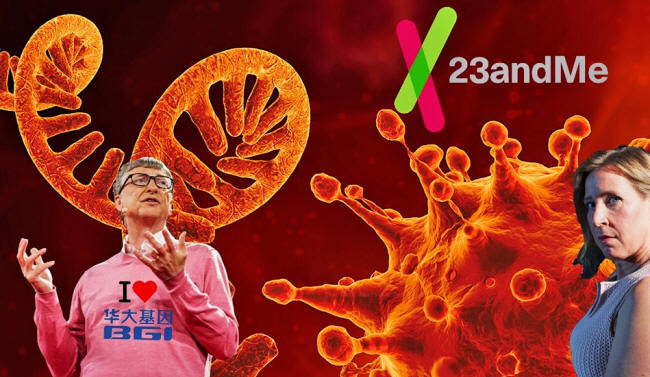|
by Derrick Broze
In late January, CBS' 60 Minutes reported:
Bill Evanina said a foreign entity could learn about a person's current or future medical conditions by studying their DNA and using this information to gain a monopoly over necessary drugs and treatments.
BGI Group declined to be interviewed by 60 Minutes and said the idea that Americans genomic data has been compromised by BGI is "groundless".
Concerns around BGI also arose in late January when Reuters reported that more than 40 publicly available documents and research papers show BGI's links to the People's Liberation Army (PLA).
Reuters said the research dealt with topics as varied as mass testing for respiratory pathogens to brain science.
The Gates Foundation and BGI
In March, journalist Natalie Winter of National Pulse uncovered documentation of a relationship between the Bill and Melinda Gates Foundation and BGI going back nearly a decade.
Winter found a Memorandum of Understanding (MOU) between the Gates Foundation and BGI to,
Specifically, this collaboration deals with developments in human, plant, and animal genomics, the study of DNA.
In the press release for the MOU, the co-founder of BGI directly mentions the partnership as focused on genomics.
Bill Gates also visited BGI headquarters in 2010, according to a report from the Financial Times.
The Times stated that BGI,
BGI's goal is to use this information for new drugs, genetic research and,
It would appear the COVID-19 crisis has helped BGI and the Gates Foundation step into the role of influencing and transforming international health policy.
Winter's report also notes that:
It's clear that BGI Group and the Gates Foundation have a documented relationship over the last decade.
It is these connections - the relationship that exists between the Chinese government, the BGI Group, and the Gates Foundation - which has sparked fears regarding the potential misuse for the COVID-19 tests manufactured by BGI.
BGI and the DNA Testing Industry
Since March 2020, BGI has sold millions of their COVID-19 test kits around the world, including the United States, Europe, and Australia.
Reuters reports that,
Coincidentally, Reuters notes that one patent from 2015 is for a,
Further, Chen Weijun, BGI's chief infectious disease expert, is listed as an inventor on the patent while also holding the title of one of the first scientists reported to have sequenced COVID-19 used samples from a military hospital in Wuhan.
BGI says the test kit developed with the Chinese military is not the same one sold to foreign countries.
The danger of COVID-19 tests being used as a method for gathering genomic data on the unsuspecting public is part of a larger conversation about the dangers posed by genealogy companies generally.
Millions of people around the world have voluntarily submitted their DNA in exchange for information about their ancestry.
The vast majority of the users of these companies, such as Ancestry and 23andMe, do not read the Terms of Service which outline how the genealogy firms can use the data.
One of the ways this data is used is to sell it to biotech companies who are interested in developing new drugs and therapies. Clearly, there are governments and militaries who also have an interest in collecting this data.
Evanina, the former counterintelligence officer, told 60 Minutes that Chinese companies are investing in U.S. biotech companies to gain access to the health data.
He says most people do not realize that their genetic material represents,
While there are clearly reasons to be concerned about the influence of the Chinese government and what they might do with your DNA, the reality is most governments with the resources will likely seek to mine DNA as well.
This absolutely includes the United States government, military, and private companies.
In the January 60 Minutes report Anne Wojcicki, CEO of 23andMe, answered questions regarding her company's use of the data they are collecting.
While Wojcicki says that her company has,
While she says she agrees that Americans should be concerned about China's investments in genomic research, she believes the answer is for the United States to invest in genetic programs.
In February it was announced 23andMe would become a publicly traded company with help from billionaire Richard Branson.
The Guardian noted that Branson's Virgin Acquisition Group said 23andMe and their,
Branson's interest in the study of DNA resembles the interests of wannabe billionaire Jeffrey Epstein.
Epstein had an obsession with funding DNA programs. Bill Gates is also a part of this web because of his relationship with Epstein and partnership with the BGI Group.
TLAV's Whitney Webb recently reported:
The DNA-Biosecurity-Big Tech Web
What is not mentioned in the 60 Minutes piece - or anywhere else - is the fact that,
Additionally, Anne Wojcicki's husband until 2015 was Sergey Brin,
The reason these connections matter is because, there are common threads between,
Understanding the incredible conflicts of interests here is of the utmost importance...
|


